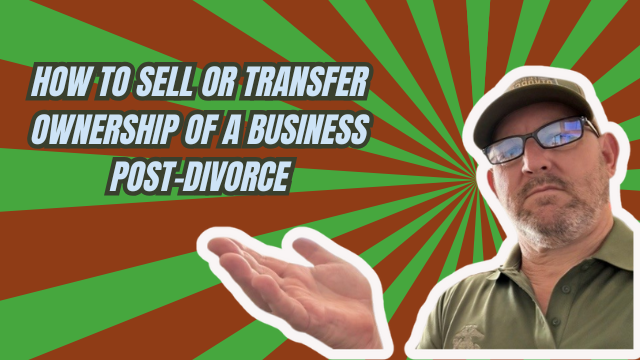How to Sell or Transfer Ownership of a Business Post-Divorce
Divorce is never easy, especially when it involves the division of a business built during the marriage. If you or your spouse own a business and are navigating the complexities of divorce, understanding how to properly sell or transfer ownership is crucial. Handling this process correctly not only protects your financial future but also helps avoid legal complications down the road.
In this guide, I’ll walk you through the essential steps to take when dividing a business in a divorce, explain how California law treats business ownership, and share practical solutions for common challenges, including real-world examples from my experience helping clients at Divorce661.
Understanding Business Ownership in a Divorce
The first step in handling a business during divorce is to determine how it is owned. In California, businesses that were started or grew during the marriage are generally considered community property, even if only one spouse was actively involved in running it.
This means the business must be valued and addressed in the divorce settlement. Whether you end up selling it, dividing it, or one spouse retains ownership, the business’s value needs to be clear and fairly distributed.
Options for Dividing Business Ownership
1. One Spouse Keeps the Business
When one spouse wants to keep the business, the other spouse is usually bought out based on a professional appraisal of the business’s value. This buyout can be structured in various ways:
- Lump sum payment: A one-time payment to buy out the other spouse’s interest.
- Structured payments: Payments over time, often with a legally binding schedule and protections.
- Property trade: Exchanging business ownership for other marital assets, such as the house or retirement accounts.
Each of these methods has its own advantages and considerations, including tax implications and cash flow impact.
2. Selling the Business Together
Sometimes, both parties agree to sell the business rather than one person keeping it. In this case, it’s important to have a clear agreement on:
- How and when the sale will occur
- How the proceeds will be divided
- Who will manage the sale process
Other factors to consider include the timing of the sale, tax consequences, and how the transition will be handled for employees and customers.
3. Continuing to Co-Own the Business
In rare cases, ex-spouses may decide to continue co-owning the business after divorce. This arrangement requires a solid partnership agreement that lays out:
- Each party’s roles and responsibilities
- Decision-making authority
- Exit strategies if one party wants to leave the business later
Without clear terms, co-ownership can lead to disputes and operational challenges.
Real Client Story: Customized Payout Plan
Recently, I worked with a client whose spouse wanted to keep the business but couldn’t afford a lump sum buyout. We helped create a settlement that included:
- A professional business valuation
- A structured payout schedule
- Legal language to protect the client if future payments were missed
This arrangement gave both parties peace of mind and allowed the business to continue operating smoothly, illustrating how flexible solutions can work when traditional buyouts aren’t feasible.
Why Professional Help Matters
Dividing a business during divorce is complex and requires attention to detail. At Divorce661, we partner with valuation experts and legal professionals to ensure:
- Your business is valued accurately
- Settlement agreements are detailed and enforceable
- Your divorce judgment clearly reflects the terms agreed upon
Having these safeguards in place helps avoid costly disputes and protects your interests long after the divorce is finalized.
Protect Your Business and Financial Future
If you’re facing divorce and need to sell or transfer business ownership, it’s critical to evaluate your options carefully and put a plan in place that works for your unique situation.
At Divorce661, we offer flat-fee divorce services that include business ownership issues, 100% remote support across California, and free consultations to help you start the process with confidence.
Don’t let the division of your business become a source of stress or financial loss. Reach out today to get expert guidance and protect what you’ve built.
Visit Divorce661.com to schedule your free consultation and learn how we can help you navigate selling or transferring your business post-divorce.




